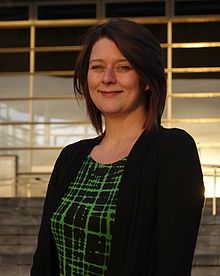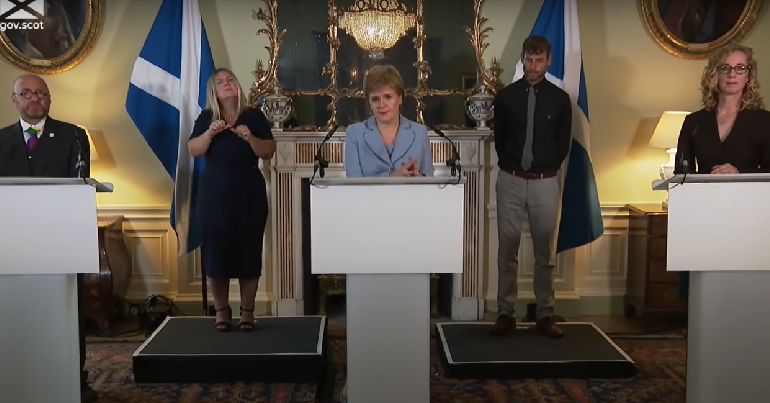Time for Plaid and the Greens to collaborate
 I watched Plaid Cymru leader Leanne Wood’s speech to her party conference this weekend on my laptop. My housemate – an economist and environmental activist – was next door, and heard the whole thing. He came in as she got her standing ovation, and asked the obvious question: “was that the leader of the Welsh Green Party?”
I watched Plaid Cymru leader Leanne Wood’s speech to her party conference this weekend on my laptop. My housemate – an economist and environmental activist – was next door, and heard the whole thing. He came in as she got her standing ovation, and asked the obvious question: “was that the leader of the Welsh Green Party?”
He’s Swiss, but studied in the UK, so his knowledge of British politics is good, but not perfect. “No, Plaid Cymru”. I explained. “Sort of like the SNP, but Welsh”.
It’s no wonder he was confused. Wood talked passionately about fighting inequality and defending a publicly owned NHS. She made the case for a democratic economy and standing up to immigrant bashers. She outlined in clear terms that austerity has failed, and the need to invest, not cut. She made the case against money being squandered on a motorway. She spoke out against war in the Middle East, and she talked about how the biggest challenge facing humanity is climate change. If the speech had been given to the Welsh Greens, it would have got thunderous applause from them too. In her post-speech press release, she even name-checked the Greens as likely to – along with Plaid and the SNP – hold the balance of power after the election.
Perhaps the only difference of emphasis from what you’d find in at a Welsh Greens conference was the quantity of chat about “standing up for Wales”. But Wales is the poorest country in Northern Europe. I don’t see how anyone could complain about them asserting their rights within the UK.
None of this should be surprising. Plaid Cymru’s MEP has sat with the Greens in the European Parliament for years. Since 2010, Caroline Lucas has sat with their MPs, and you’ll struggle to find an issue where they have voted in different ways. Sure, the emphasis isn’t always the same, but the analysis is remarkably similar: both are parties of the left (a rare beast in Westminster these days), but both instinctively believe in decentralising power rather than pulling it all into the middle.
There is some history of collaboration between Plaid and the Greens, with a pact in 1992 contributing to the election of one joint Plaid/Green MP. But since then, the two parties have gone their separate ways, and the Welsh Greens have on the whole been small enough that they haven’t really got in Plaid’s way much.
Perhaps now, though, it’s time to think a little more about the relationship between the two parties. Both have seen their membership grow in recent months – the Welsh Greens by a staggering 76% this year alone. Plaid already have three MPs, and look like they might well take another two in May. And as both parties expand, they’ll likely find themselves bumping against each other much more often. And as they do, they’re going to have to decide whether they want to spend their time squabbling with each other over the same pool of voters, or taking the fight to the neoliberal Westminster establishment.
In the short term there are some clear advantages to both parties of such a relationship. I think there are five seats that Plaid have a good chance of winning in May: the three they currently hold, plus Ceredigion and Ynys Môn. In both of the latter, they came first in the Euro elections, have most councillors in the seats, and have had MPs in them in the relatively recent past.
It’s up to the local parties in those areas to decide what they want to do, but if Plaid and Greens there could come to some sort of arrangement where Greens would support the Plaid candidate, then I think that would be a good thing. Likewise, in places where Greens aren’t standing – and there will inevitably be some, then we may as well back the Plaid candidate. In exchange, I think Greens should expect something: perhaps a free run at Cardiff West? And maybe then in council elections in a couple of target wards in that area of the city?
But the real point here isn’t short term electoral gain. The point is about the radical transformation we must have if we are going to come close to solving the problems we face. The need to rip power from the hands of those who are using it to enrich their friends and fry the planet is more urgent than ever.
And in that changing context, politics is becoming more pluralist than ever before. For a range of reasons – from the nature of modern work-places and communities to changes in communications technology, mass parties have broken up on both the right and the left. Progressives and radicals can either fight against this trend, and forever assert that their party alone has a monopoly on wisdom. Or we can follow the flow, collaborate, and open up opportunities to win real changes.
Getting back to specifics, there are questions about the long game in Wales, so let me lay my cards on the table – if nothing else so people can tell me why I’m wrong: I’d like to end up in a position where, rather like a progressive version of the Australian Liberal/National Alliance, Welsh Greens and Plaid Cymru remain formally separate parties, but never run against each other, and allow dual membership and, where a dual member was selected as a candidate by both parties, joint ballot descriptions.
In the case of the Greens, collaboration is nothing new: repeated London Mayoral candidates have called on voters to give their second preference vote to Ken Livingstone. Caroline Lucas backed Salma Yaqoob in 2010 and, in return, Respect didn’t run in Brighton Pavilion. Greens in Germany formed an electoral alliance with the East German pro-democracy movement Bundis 90. Most of us are accustomed to organising in social movements with people from other parties and none.
And in the case of Plaid, there is certainly a willingness to talk about such things – when I interviewed Leanne Wood earlier this year, she said “I see a lot of sense in collaborating closely with the Green Party”. Monday’s Morning Star has a story about them discussing just such a deal. As mentioned above, when Leanne Wood talked about potentially holding the balance of power in 2015, she explicitly made clear that she imagined doing so with the SNP and Greens.
Of course, in any given potential collaboration, context is king. Local Greens and Plaid members will know their local situations better than I do. But, from where I’m sitting, I see an almighty task ahead of us if we are to displace the neoliberal parties which dominate British politics. If modern pluralistic, progressive movements are to succeed in that task, a little co-operation wouldn’t go amiss.




Outsiders may assume the Wales Green Party rates with the Scottish Greens on the political scene, but in no way. The Welsh are not independent, just a ‘region’ of the England & Wales GP. Their membership numbers are untransparent (claim 76% increase on an unknown but tiny base figure) but the approaching 800 figure of a Morning Star journo compares badly with the 6000 of the Scottish Green Party (and 8000 of Plaid Cymru). It’s a one-person band (the ‘Pippa Party’); Bartolotti has moved to expel me for referring to her murky businesswoman past in electronics, including supplies to military and nuclear weapons companies (pippabartolotti.info). Her former husband Mark Hayward and lead partner in the businesses, goes unmentioned in her own sanitized CV. No basis for a serious player in Welsh politics, as Welsh journalists have realised.
the welsh blogger the greendragon has also raised this question to
http://agreenwales.blogspot.co.uk/2014/10/will-plaid-and-greens-go-back-to-future.html